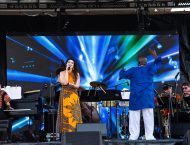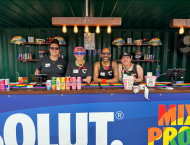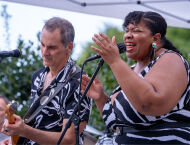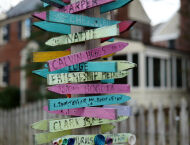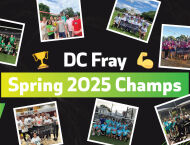Music
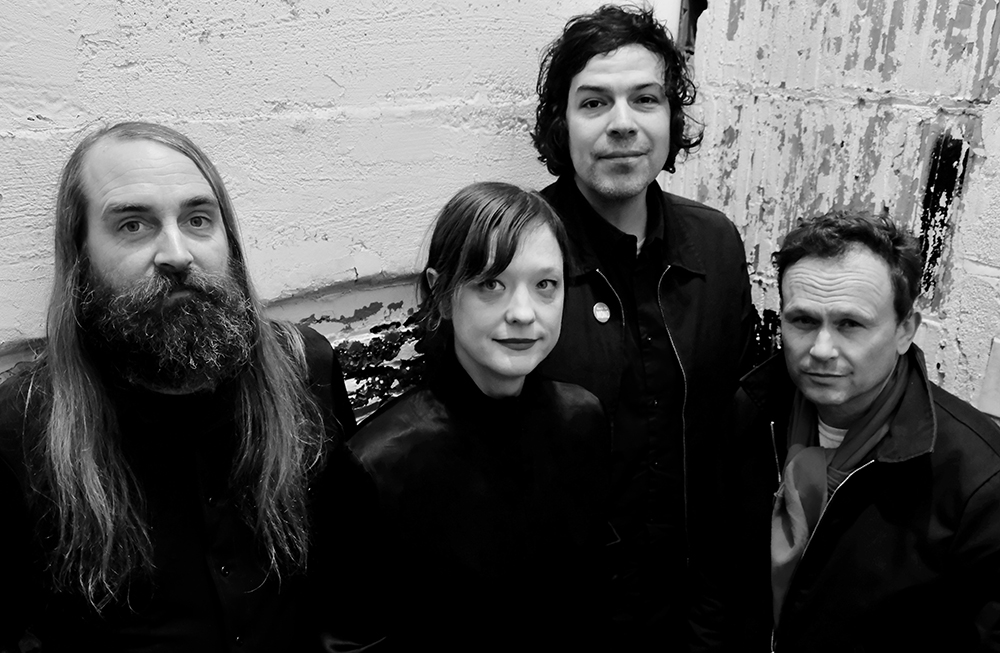 Hammered Hulls. Photo by Claire Packer.
Hammered Hulls. Photo by Claire Packer.
City Sounds: An Ode to D.C. Music Past, Present + Future
March 7, 2020 @ 8:40pm
D.C. is a music town just as much as it is a political town, a culinary town or a sports town. Music in the District is, at its heart, the thread that weaves our communities, histories and spaces together. We’ve seen Black Broadway, go-go, hardcore and its accompanying straight-edge movement blossom. We have world-class, thousand-seat venues and DIY spaces paving the way for the most marginalized voices in music to not only be heard, but honored. To celebrate all that’s still to come in our city’s music scene, we spoke to three people who are still breathing life into D.C. music through their varied work.
The Icon: Mark Cisneros
Local music icon Mark Cisneros came to D.C. by way of L.A. years ago, chasing the magic that the District was creating. In 2020, Cisneros is still hard at work making sonic magic with contributions to bands in D.C. and beyond. His work led him to something of a supergroup, Hammered Hulls, with fellow D.C. musicians Mary Timony, Alec MacKaye and Chris Wilson. Cisneros describes the band as having a very D.C. sound, drawing from musicians who are close to heart, but is quick to point out, “that term always seemed a little off. Even in the classic ‘harDCore’ days the sounds and bands were incredibly varied. D.C. has such a rich and diverse musical history. Still, Cisneros says he “hope[s] [Hammered Hulls] sound[s] like that, with spirited intent.” Before you catch the band live alongside Light Beams and Algiers, we picked Cisneros’ brain about all things D.C. music.
District Fray: You’ve been a fixture in the D.C. music scene for quite some time now. Can you sum up what makes D.C.’s music scene great to you?
Mark Cisneros: The D.C. music scene I’ve experienced has been pretty much exactly how I imagined and hoped it would be: a very supportive and open environment for creating. Honest work toward the art, and an ethical and socially/politically aware approach. Musicians don’t come here to “make it.” If anyone has those types of inclinations they inevitably leave for a place where that can maybe happen for them. There’s a lot of integrity in the D.C. music scene that has become a real statement about what is done here.
How has the scene changed in the years you’ve been active? How do you see it evolving?
It ebbs and flows with young musicians making new bands, house shows and DIY spaces coming and going – varying degrees of activity and inactivity of older bands and older musicians, etc. We just came out of a very busy and fruitful period that happened over the last five years or so. Fortunately, there are some new releases on the way and new bands playing their first shows. I’m very excited for this year in D.C. music, and it’s off to an amazing start with new records by Too Free, Time Is Fire and Coriky.
What are some quintessential D.C. music-related hangouts you’ve frequented over the years? How have those spaces changed and evolved?
The Black Cat is the place. I’ve played there and hung out there more times than any other place in the world. I love everyone there and it’s been a home to D.C. punk for almost 30 years.
My wife, Alyssa Bell (aka DJ Baby Alcatraz), and I even got married there last year. Comet Ping Pong has also been a great and very supportive venue for the D.C. music scene. The incredible church shows at St. Stephen and Sacred Heart. The 9:30 Club. U Street Music Hall has welcomed smaller shows that help the scene. DC9 has also really stepped up to fill the gap left by the Black Cat closing its smaller Backstage room. Very special mention needs to go to the art and community center Rhizome whose programming has created a wonderful home for more fringe acts including avant-garde electronic music, noise, free jazz, improvisational music and experimental artists of all mediums.
Do you have any other shows or releases, with Hammered Hulls or other projects, on the horizon this year?
I’m very happy to say that Hammered Hulls will be going into fabled Inner Ear studios again this month to record our full-length LP for Dischord Records. Des Demonas will soon be releasing a new 12” EP for In The Red Records. Kid Congo and the Pink Monkey Birds also just recorded a new 12” EP for In The Red Records that should hopefully be out this summer. Low Ways Quartet will be heading to the studio soon as well. There are a couple of other little surprises planned for this year.
Catch Hammered Hulls live on March 12 with Light Beams and Algiers at the Black Cat. Doors open at 7:30 p.m. Tickets $15. For more on Hammered Hulls, visit hammeredhulls.bandcamp.com.
Black Cat: 1811 14th St. NW, DC; www.blackcatdc.com
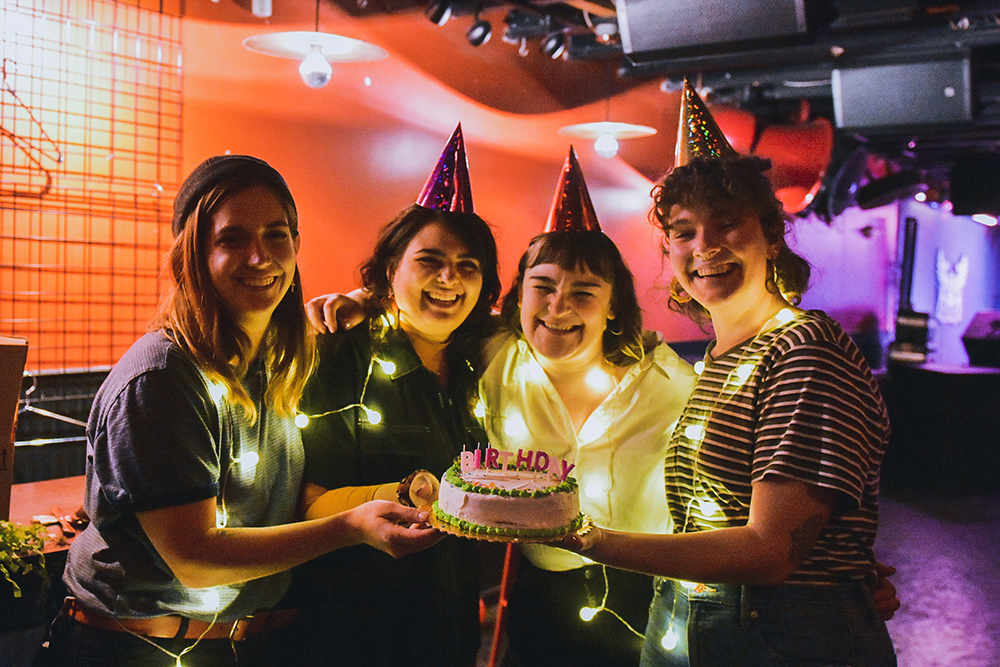
Concert Moms. Photo by Meredith Wohl.
The Changemakers: Concert Moms
Concert Moms, a booking and management group with roots in D.C., but a reach that stretches to Alaska, was born from a group of young women wanting to see themselves and their friends better represented in DIY, local and national music scenes. A year in, Hannah Swearman and the other “moms” book D.C. shows everywhere from houses in Park View to well-established venues like DC9 Nightclub and Songbyrd’s Vinyl Lounge.
District Fray: What gap in the music industry were trying to fill?
Hannah Swearman: At the most basic level, we wanted to prioritize bills that weren’t all straight white dudes with guitars – you’d think that’s a low bar, but honestly, there’s still so much work that needs to be done, especially if you think of DIY as the training ground for bands who break into the industry at large.
How would you sum up everything you all offer?
The primary two halves of Concert Moms are show promotion and artist management. As promoters we book artists at venues around D.C., and occasionally N.Y.C., L.A. and Detroit under the “Concert Moms” name. For management, we work with a small roster of artists to grow their careers through booking tours, fielding PR, marketing strategy – pretty much anything they want help with.
How do you hope to positively influence the D.C. scene, and the overall music world?
I hope we can be part of creating spaces for artists who have been traditionally underrepresented and leave our own small mark on D.C. music history. I’d love to create a D.C. scene that’s more diverse, more integrated – one where it’s not acceptable to have a bill that’s just all straight white dudes. I’d love to push the scene to a place that’s more queer, more accessible to all – and also foster a culture of paying bands appropriately.
You can check out Concert Moms and their roster, upcoming events and more by visiting www.concertmoms.com. Follow them on Instagram and Twitter @concertmoms.
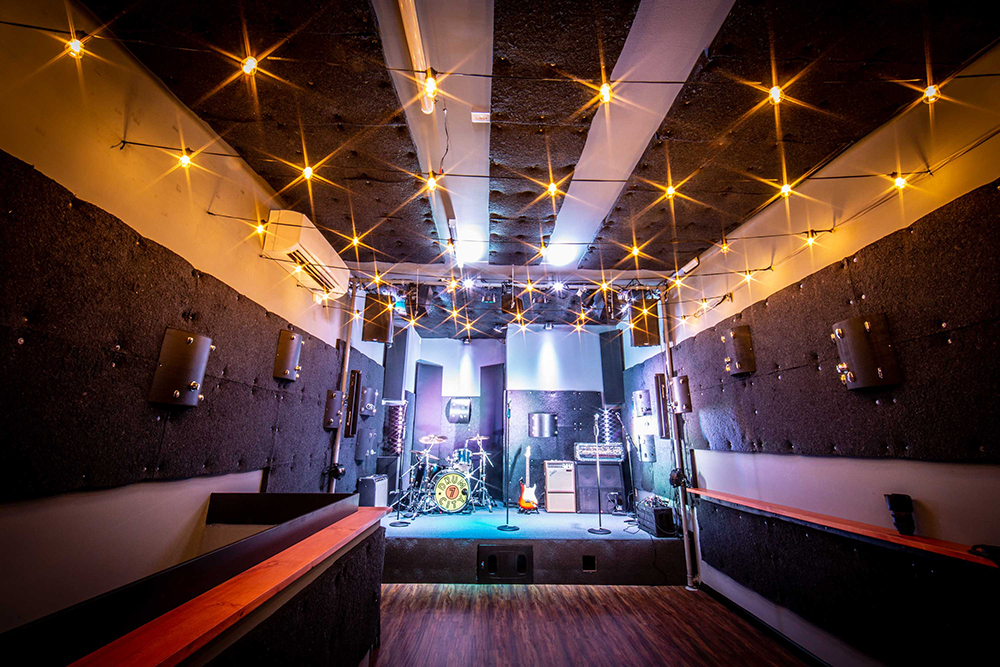
The Pocket. Photo courtesy of 7DrumCity.
The Innovators: The Pocket at 7DrumCity
As the needs of music studio 7DrumCity evolved, owner and founder Miles Ryan saw a new opportunity to further not only the fostered community, but to open doors by transforming the space’s top floor into a venue. With a 70 person capacity, Ryan hopes the space, dubbed The Pocket in reference to the studio’s percussive roots, can serve as a launchpad for smaller artists to kick their careers into high gear.
District Fray: What led you to opening this space within 7DrumCity?
Miles Ryan: [7DrumCity] is a central hub for bands in D.C. We function as an incubator, or a way to enable young musicians and bands to find a path into bigger venues. We have this existing community and we have all these great artists come through the space, and before, we always had to send them to the outside world to perform. As an appointment-based business, the barrier to entry for participating in the 7DrumCity community was high. Having the venue gets a lot of people in the door and they know it works the other way, where the people who are already here can be celebrated.
What does a small, 70-person capacity venue like The Pocket bring to the 7DrumCity community?
It provides more meaning in people’s lives. You feel more in touch with the artists. It’s like when you’re at a house party. You end up talking to most of the people at the party because there’s nowhere else to go. Here, there isn’t really a backstage. Artists come up stage and go past you.
How else do you see The Pocket providing something different?
We’re not a bar or a restaurant [with] a venue. We make most of our money from the other businesses we run, so we have a unique situation where if The Pocket has a crappy month, it won’t kill us. But, if this model where you have lessons [and] rehearsal space in the same place as a venue works, that could be a cool breakthrough.
For a full list of The Pocket’s upcoming shows, visit www.7drumcity.com.
The Pocket at 7DrumCity: 1506 N. Capitol St. NW, DC; www.7drumcity.com/the-pocket


